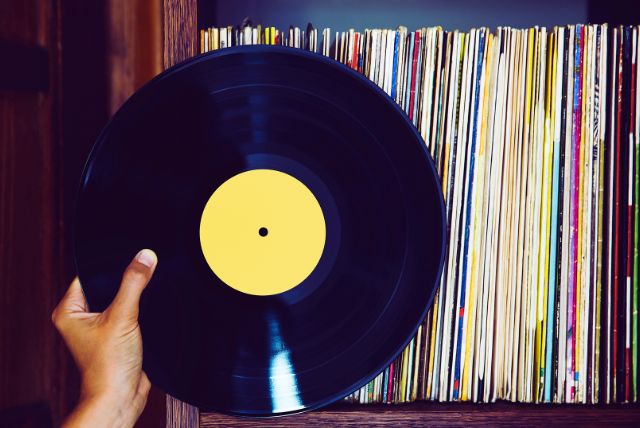Being a kid who was introduced to vinyl at a very early age, I always saw my grandfather struggle with maintaining his precious records. The only option he had back then to clean vinyl records was to use a dishwasher detergent and a normal cloth to clean them once in a while, WHICH WAS NOT ENOUGH!
As a result, at times, records sounded weird or even skipped in between. My grandfather hated it. I hated it. As a serious audiophile, when you are obsessed with good music and the only option you have is vinyl, you don’t want your experience to be ruined.
One thing I learned at that time was cloth and detergent were not the best option. Records need better ways to clean and need better care.
The only problem back then was we had very limited options. But the scenario is completely changed today. A lot more cleaning options are available; some are budget-friendly, like carbon fiber brush or a cleaning kit but need proper care to be executed well, while some are a bit expensive, like vacuum cleaners or record washers, but ensure your records are properly cleaned and can be played till eternity (JUST KIDDING).
Now, without wasting any more minutes, let me share all my secrets on how to clean records with you guys because you are audiophiles, and I am an audiophile. That already makes us a big family.

Cleaning stuff you need to clean vinyl records.
Before you get your hands dirty, here are the things you need.
For Quick basic cleaning:
A carbon fiber brush
For more better cleaning:
- Cleaning solution
- Microfiber cleaning cloth
For more deeper cleaning (Recommended):
- Record cleaning kit
- Vacuum cleaner
- Record washers
Dry carbon fiber brush
it is one of the quickest and simplest ways to clean your LPs. I recommend brushing your records before you play them; it helps to remove all the dust and dirt from the surface.
Here are the steps to use the brush:
- Pick up the record (Don’t forget to hold it from the middle).
- Use the brush and gently drift its bristles around the surface of the vinyl in a circular motion. Remember not to press the brush too hard, as it can damage the record grooves.
- Once you are done with one side, repeat it for the other side as well.
Cleaning solution and microfiber cleaning cloth
A good cleaning solution with a microfiber cloth is the most budget-friendly way to clean your vinyl. I use a boundless audio record cleaner solution, but if you want, you can also make your cleaning solution at home.
Just mix a few drops of mild dish soap, 300 ml of distilled water and 75ml of isopropyl alcohol in a small spray bottle, and you are good to go.
Important point: Make sure the isopropyl alcohol is always 1/4th of the water, as too much of it can damage the protective coating of the record.
Now, let’s get to the point of how you can clean your records using a cleaning solution and a microfibre cloth.
- Take your cleaning solution and spray it on the cloth.
- Pick up the record (Don’t forget to hold it from the middle).
- After that, wipe your records in a circular motion in the direction of the grooves. Remember, don’t press too hard, be gentle.
- Repeat it for the other side.
- Let it dry naturally, and you are done with the cleaning.
Invest in a cleaning kit.
Suppose you don’t want the hassle of creating a cleaning solution by yourself or don’t want to buy a brush and cleaning solution separately. You can invest in a cleaning kit.
It’s a complete solution that includes a cleaning solution, carbon fibre and anti-static brush, microfiber cleaning cloth, and stylus brush, and in some kits, they also have cleaning pads or rollers for more thorough cleaning.
If you want a complete cleaning solution, I recommend you go with a cleaning kit. The instruction manual is already included in the cleaning kit, so you don’t need to worry about how to use it.
Vacuum cleaner
You can use a record vacuum cleaner. But wait, these are not your everyday household vacuum cleaners.
Record vacuum cleaners are specifically made to clean delicate records. They suck up dirt that gets settled into the grooves while simultaneously minimizing pressure and physical contact with the record surface.
These are a bit more expensive than other cleaning options, but man, I tell you, when they are done cleaning your records, they look as good as new. And if you are like me, who is a bit clumsy, you would leave the job to the expert.
Here are my top picks:
- Record doctor VI record cleaning machine
- Pro-Ject VC-E Record Cleaning Machine
Record washers
Don’t want to spend a lot on fancy Vacuum cleaners? I GOT YOU. Here is a more budget-friendly way you can go with a record washer. It’s a manual system composed of brushes and rollers that use an accompanying solution to clean your records.
To use a record cleaner:
- Insert the record into the cleaner.
- Rotate it by hand for a few revolutions.
- And you are done.
Here is my top pick:
Starter kit from Spin Clean.
Clean your needle (Bonus tip)
A bonus tip for you guys. Don’t forget to clean your needle!
As your records play, your needle collects dust and dirt from inside the groove. It’s a good idea to give it a quick cleaning. You can either use a soft fine-tip brush or a carbon fiber brush to clean the needle. Here is guide for you to increase your needle lifespan.
Final Tone
I must say, this was all of my wisdom on cleaning vinyl discs that I shared with you in this article. All the solutions that I am able to present came from a generation of vinyl love.
If I missed something or you have tried any other way to clean your beloved records, don’t hesitate to share them with me in the comments.
I would love to try them myself!
Frequently Asked Questions
Q: Is it OK to clean vinyl with water?
If you see dust and dirt in the vinyl record grooves, you can clean it with cold water. Remember to use distilled water and avoid using tap water to avoid impurities from getting into your record groove. Also, avoid the label and dry the record completely before playing on a turntable.
Q: Can you clean vinyl with soap?
Yes, you can clean your vinyl record with a mild soap that doesn’t contain any harsh chemicals. Always mix a small amount of soap with water to create a cleaning solution, and avoid using undiluted soap.



I have been following your blog for quite a while, I must say the tip and tricks you share are really helpful.
Keep up the good work!
Thanks a lot nick for the kind words! I always try my best to bring you the best information.
I came across your site wanting to learn more and you did not disappoint. Keep up the terrific work, and just so you know, I have bookmarked your page to stay in the loop of your future posts. Have a wonderful day!
Thanks for the appreciation felix. You too have a great day ahead! 🙂